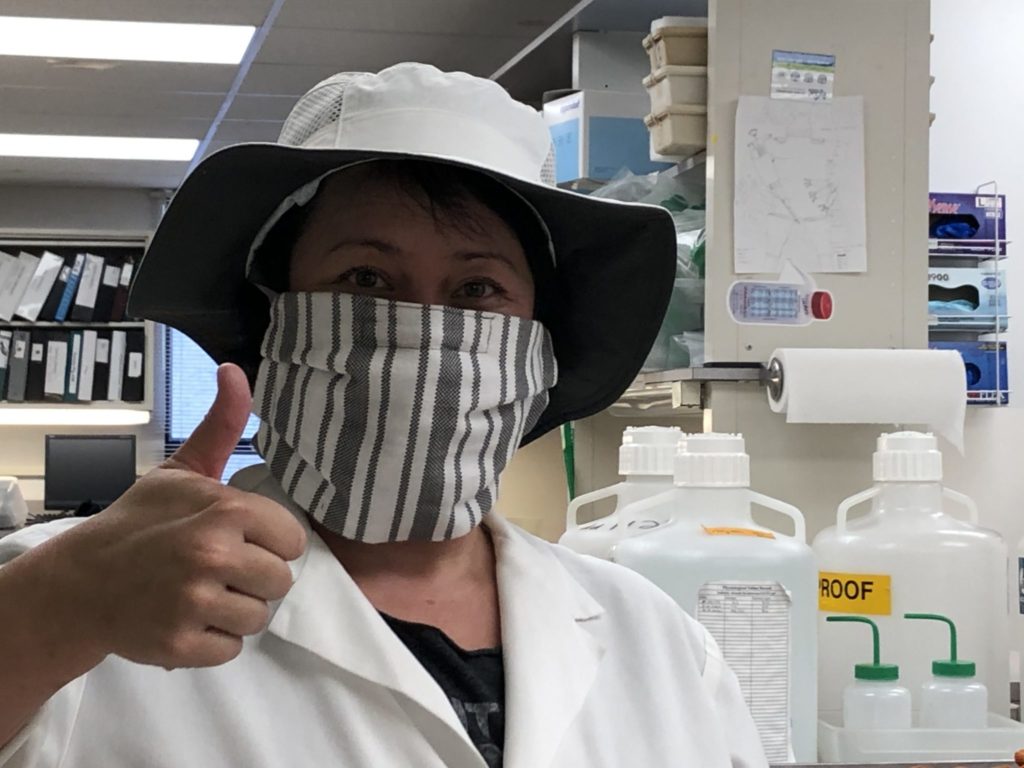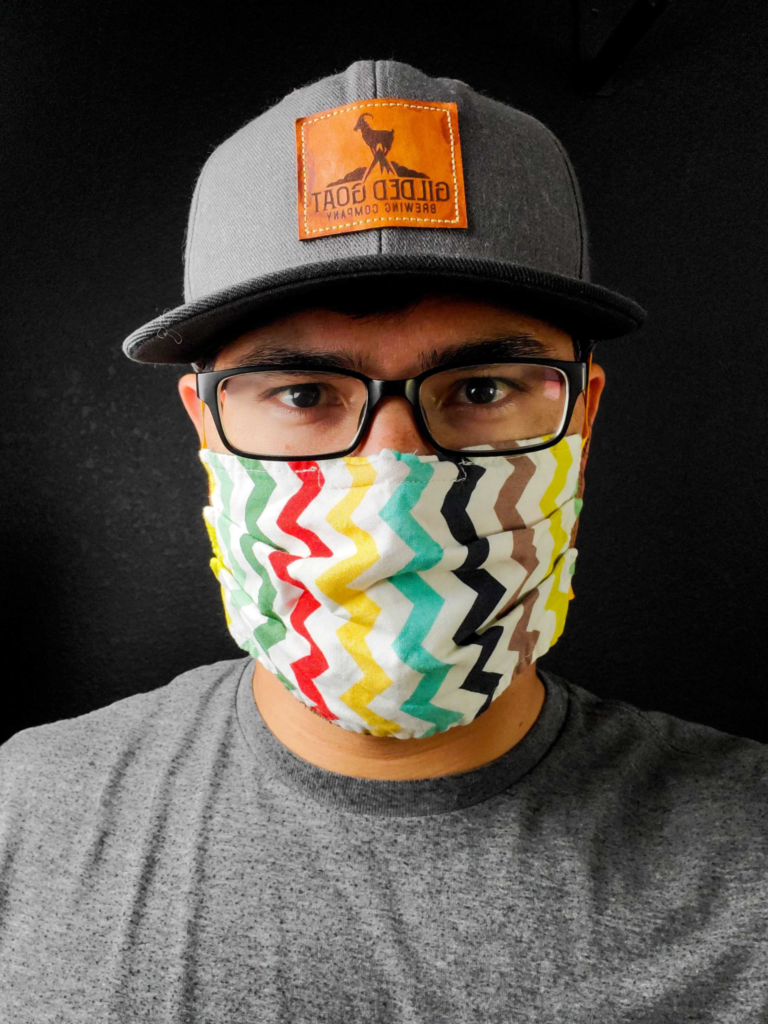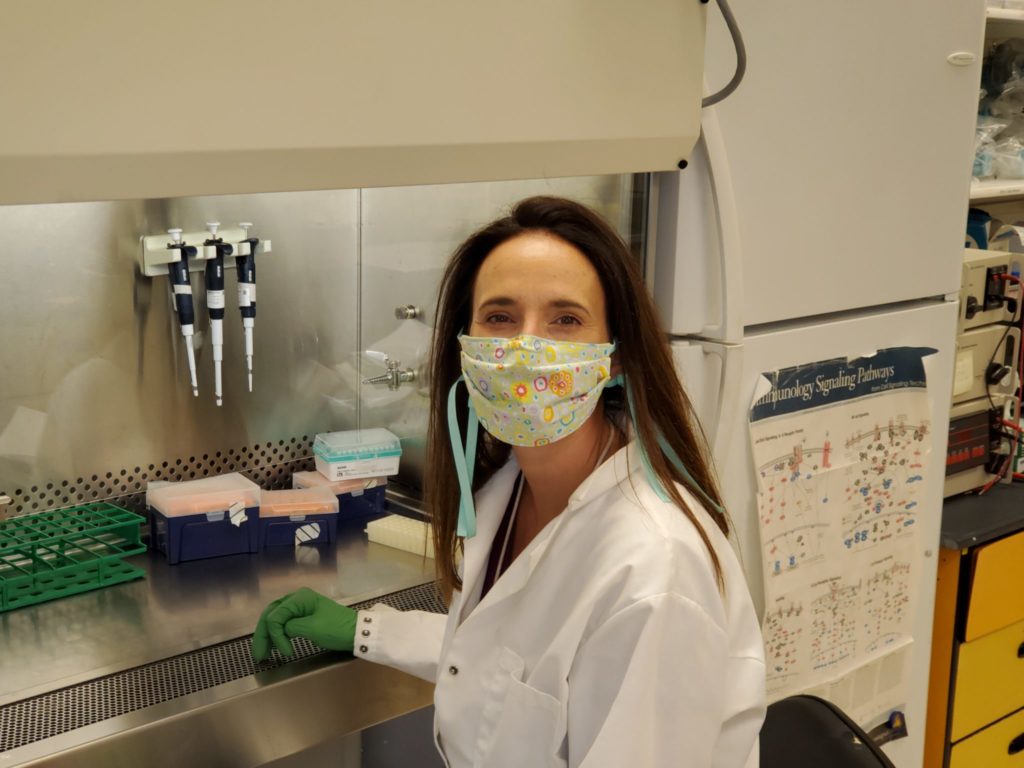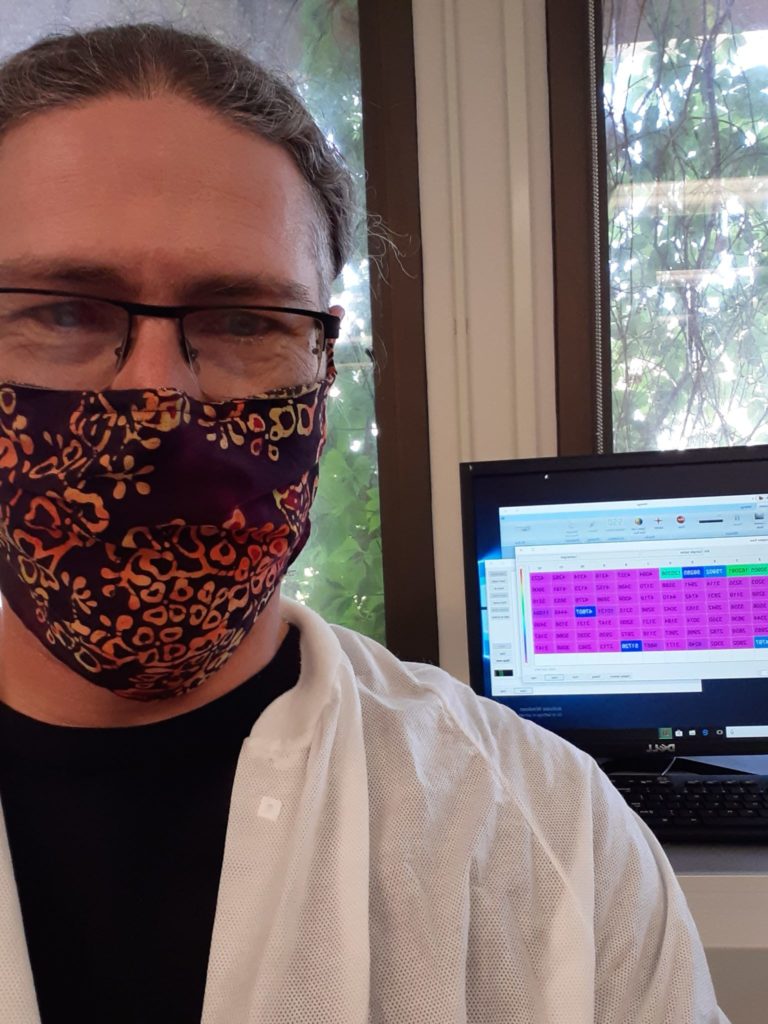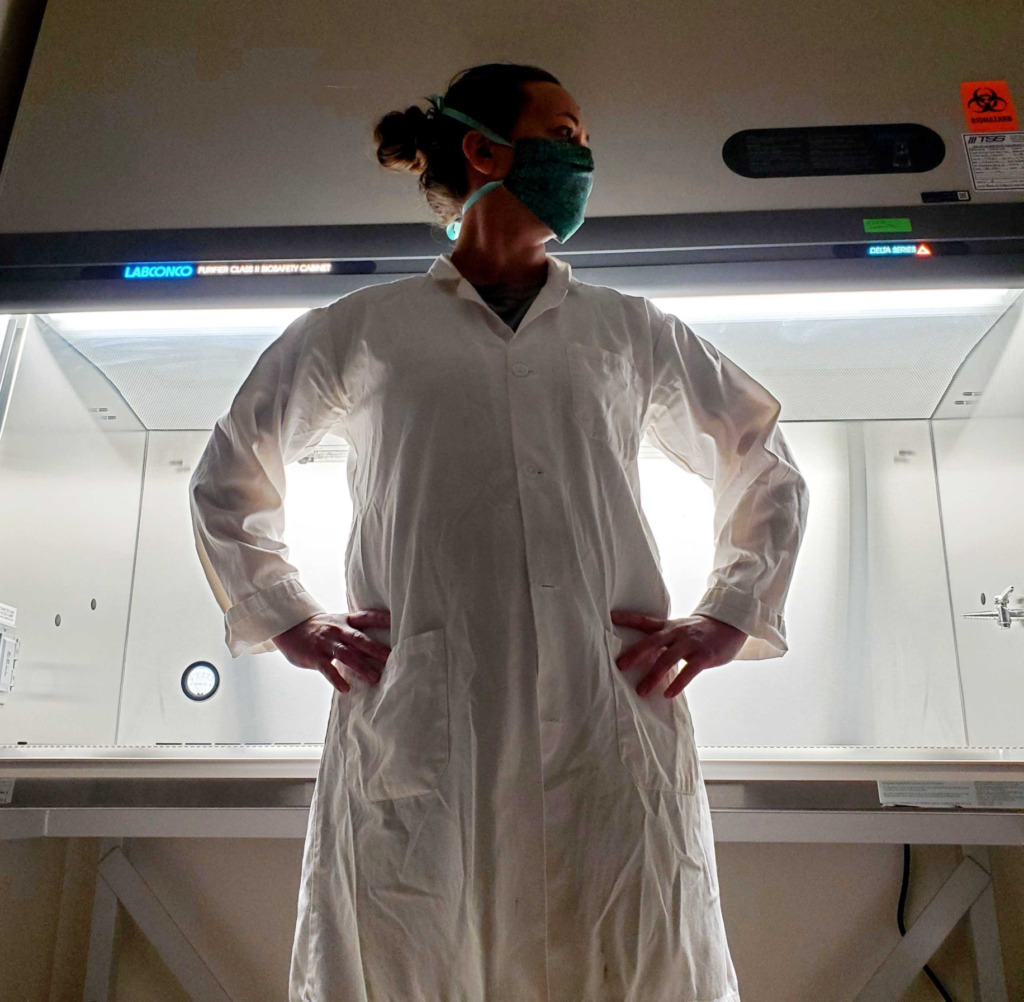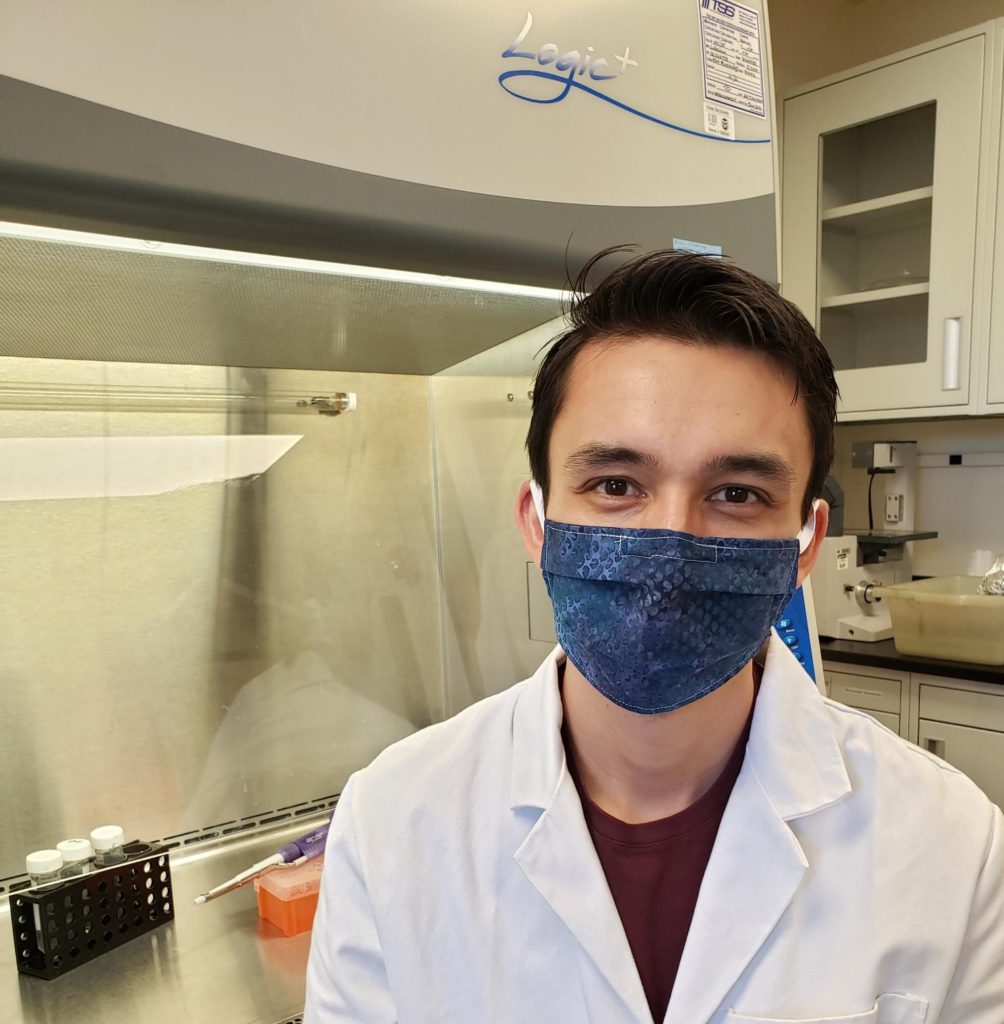MIP employees and students model their volunteer-sewn fabric face masks. (CVMBS photos)
Volunteers in the Department of Microbiology, Immunology, and Pathology (MIP) sewed over 1,000 face masks for employees to wear at work during the COVID-19 pandemic. This helped the department prepare for a gradual return to research operations starting in May, after Colorado’s Stay at Home restrictions were lifted. Per public health guidance, returning employees are required to wear face coverings in the buildings to maintain safety.
The department recognized the importance of providing equal access to fabric face masks for its more than 500 employees, so Professor Jeffrey Wilusz, associate department head for research, sought volunteers for supplies and sewing face masks that could be distributed department-wide. Wilusz’s request for volunteers received 15 enthusiastic responses within the first hour.
Lesley Jones, assistant to department head Dr. Gregg Dean, donated all of the fabric, enough for the volunteer sewers to make anywhere from 20 to over 100 masks each. Her mother used to be an avid quilter, who expressed her affection for others through handmade items, and collected a whole rainbow of patterned fabric. “I wasn’t sure what to do with all of her fabric and [this] was the perfect solution. She is thrilled that we used her fabric and that it went to a great cause,” Jones said.
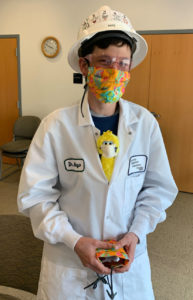
The opportunity to positively contribute to their department encouraged over 25 faculty, staff, students, and their extended personal networks to volunteer. A few of the volunteers – active quilters, artists, and costume makers – had already applied their skills to sew face masks for those around them. Others dusted off their sewing machines and contributed their basic knowledge of sewing for the greater MIP cause. Having learned sewing as part of middle school curriculum in India, research scientist, Venugopal Pujari of the Mycobacteria Research Laboratories (MRL), and his wife Uma Muthurajan, sewed 20 face masks by hand.
Despite a few broken needles along the way, the volunteers figured out the necessary steps and many eventually developed an assembly line approach. MRL research associate, Megan Lucas, and doctoral student Joanie Ryan collaborated on 108 face masks – Joanie’s family washed and cut the mask supplies, and passed them along for Megan to sew. Professor Lora Ballweber was able to include her visually impaired 94-year-old mother in the process, using a pre-cut guide to size the necessary ribbons for ties and pipe cleaners for the flexible nose pieces.
Distanced, but connected
Sewing all of these colorful face masks proved a way for many of the volunteers to feel connected to their fellow employees in the department, while staying at home and social distancing. It also allowed a great many to work together with their family, friends, neighbors, and even a few felines. Emma Harris, a postdoctoral fellow in the Arthropod-borne and Infectious Diseases Laboratory (AIDL), seized the unique moment to purchase a used 1964 Singer sewing machine and relearn what her grandmother had taught her before she passed away, which “felt very much like a gift in the midst of turbulent times.”
Some MIP faculty and staff were also active in a CSU Veterinary Health System (VHS) push in early April to supply fabric face masks for essential veterinary employees. Given the urgent compliance need, their volunteers – an employee assembly line and veterinary students from home – sewed an initial 300 masks in a week. MIP associate professor Christie Mayo, as a member on the VHS Emergency Management team, described the whole process as an incredible example of “VHS Strong:” prototyping patterns, rallying volunteers at every stage, and direct distribution of over 800 face masks for VHS employees.
The MIP volunteer sewing network even extended beyond Colorado. Excited by face masks as a new creative outlet, MIP doctoral student Lyndsey Gray’s mother, a self-taught fiber artist, and a network of her craft friends in Florida, made over 100 masks for the department. Associate department head for undergraduate education and associate professor Jennifer McLean’s parents sewed 100 face masks in Minnesota. “They are the most industrious people I know,” she said. “My dad retired from farming this year, so he bought himself a fancy sewing machine to help my mom sew quilts and now face masks. He’s been watching her sew for decades and I guess he decided it would be nice to have his own machine.”
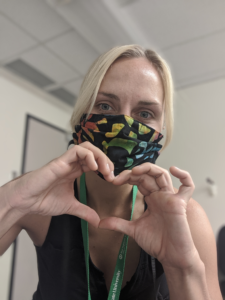
In less than two months, volunteers sewed more than 1,000 face masks and have supplied 22 labs, a “laudable” effort said Wilusz. The stock of masks solved a major shortage within shared research space at the Foothills Campus, allowing adherence to safety protocols. As research projects gradually restart and preparations begin for on-campus classes this fall, there are enough to supply all MIP employees with at least two fabric face masks each.
In May, AIDL research associate Susi Bennett spent “fun family time” with her husband and 11-year-old twins sewing over 150 face masks. She continues to contribute to the department, by organizing regular laundering of used fabric face masks and lab coats. “Now that our groups are getting back to work, I see all the different ones [face masks], so different from mine and it makes me smile,” Bennett said, smiling from behind her vibrant mask.
Special thanks to MIP volunteers Zaid Abdo, Lora Ballweber, Susi Bennett, Erin Borland, Jenna Cao, Janine Crick, Laura Goodrich, Lindsey Gray, Milena Guajardo, Emma Harris, Deryl Keney, Tessa Laschober, Megan Lucas, Kandi Mathiason, Ashley McGrew, Jenny McLean, Christine Olver, Venugopal Pujari, Marissa Quilici, Devynn Ritchie, Susan Rogers, Joanie Ryan, Rhea Smith, Ciara Suggs, Donna Willard, Lisa Woolhiser, and their great network of family, friends, and neighbors for sewing fabric face masks.
